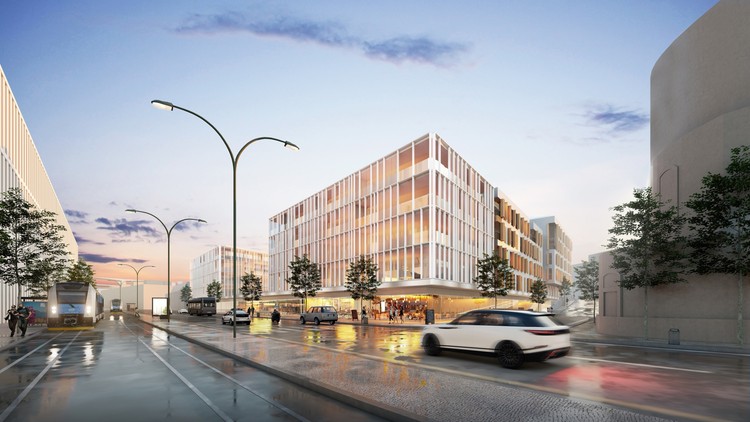
EAA-Emre Arolat Architecture has revealed their design for Alcantara Gardens in Lisbon, Portugal. The 23,000-square-meter scheme contains residential, apartments, office spaces, and public amenities behind facades inspired by vernacular design.

The complex contains 93 residential units, ranging from apartments for families to small units for short term stays. Apartments on the podium level open into a private garden with a rooftop terrace which includes a private pool and spa. At street level, a modest opening leads to a public courtyard adorned with restaurants and shops.

Adjacent to Lisbon’s historic commercial center, the scheme sits in an industrial setting fronting waterfront developments. A bustling neighborhood along the Tagus River, Alcantara is home to a port with vibrant rows of warehouses and industrial buildings mostly converted into restaurants and nightclubs, and a residential neighborhood where historic building stock is preserved.

The massing of the scheme is influenced by its dual context of old residential blocks and the waterfront settlement. Parts facing the residential blocks, remnants of Lisbon’s 18th-century Pombaline style, are articulated to reflect the fragmentation in size and offers an interpretation of the local façade style with predominantly opaque facades and shuttered openings.

Meanwhile, the elements closer to the waterfront settlement become bigger in size with a more contemporary façade language in sync with the emerging contemporary typologies along the shoreline. As a result of this duality, the façade alteration and materials are varied from stucco walls with small openings and interior balconies to floor-to-ceiling glazed facades with generous terraces encouraging exterior use.

Regardless of the city or place, the process of urban renewal as it becomes a way of transformation and gentrification is highly critical where one of the common tendencies of the modern world is to alienate or even underestimate the existing environment while introducing a new structure. Instead of this notion which does not give credit to any kind of physical, cultural or otherwise continuity, we embody an approach that incorporates the spirit of the place, interpret it, and in this context, paves the way for the socio-cultural continuity of the city.
-Emre Arolat

Construction of the scheme is set to begin in early 2020, with completion by mid-2022.
News via: Emre Arolat Architecture
















